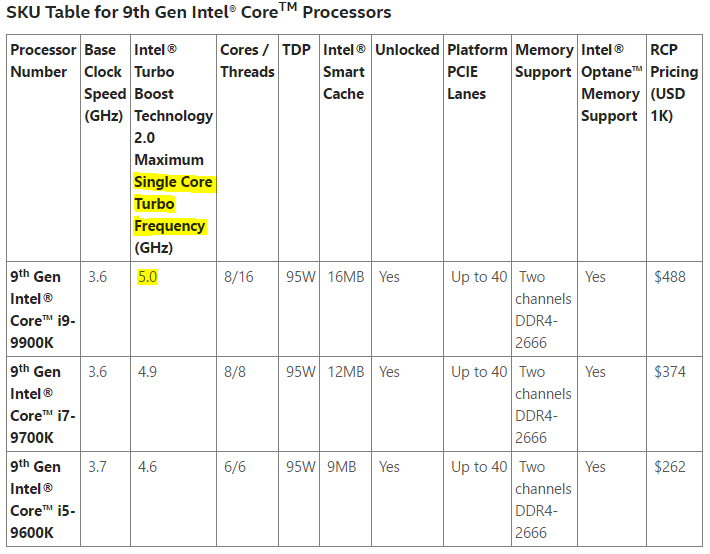- Joined
- Mar 3, 2018
- Messages
- 1,713
Intel launched a flurry of new processors on their livestream today. But for many, the refreshed Coffee Lake lineup is probably the highlight. The Core i9 9900k is Intel's first high volume "5Ghz" CPU, with a 3.6ghz base clock, a 5.0Ghz 2 core boost and a 4.7Ghz all-core boost speed. It also features 8 cores with 16 threads, 16MB of L3 cache, and a $488 MSRP. The i7 9700k features 8 cores without hyperthreading, 12MB of cache, and a 4.9ghz single core turbo speed as well as a 3.6ghz base clock and a $374 MSRP. The i5 9600k has 6 cores without hyperthreading, 9MB of L3, a 3.7ghz base clock, a 4.6ghz turbo speed, and a more modest $262 MSRP. All these processors have a 95W TDP, come in a dodecahedron-shaped box, and are compatible with existing Z370 motherboards.
To realize the full potential of the new 9th Gen Intel Core processor, Intel is introducing the new Intel Z390 chipset. The Intel Z390 chipset includes high-speed integrated USB 3.1 Gen 2 and integrated Intel Wireless-AC with support for Gigabit Wi-Fi speed. The 9th Gen Intel Core processors are also compatible with all Intel 300 Series chipset motherboards for more consumer options. Preorders for the 9th Gen Intel Core processors and Intel Z390 chipset motherboards begin today from a variety of global vendors and retailers.
To realize the full potential of the new 9th Gen Intel Core processor, Intel is introducing the new Intel Z390 chipset. The Intel Z390 chipset includes high-speed integrated USB 3.1 Gen 2 and integrated Intel Wireless-AC with support for Gigabit Wi-Fi speed. The 9th Gen Intel Core processors are also compatible with all Intel 300 Series chipset motherboards for more consumer options. Preorders for the 9th Gen Intel Core processors and Intel Z390 chipset motherboards begin today from a variety of global vendors and retailers.
![[H]ard|Forum](/styles/hardforum/xenforo/logo_dark.png)
